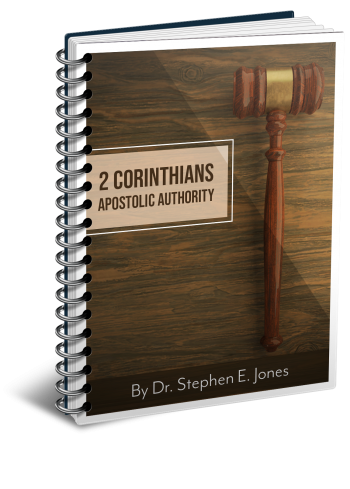Latest Posts
View the latest posts in an easy-to-read list format, with filtering options.

An in-depth commentary/study on the second book of Corinthians
Category - Bible Commentaries

The eighth chapter of Second Corinthians is about giving to the saints in need. It should be viewed in the context of the earlier plan to send relief to the saints in Jerusalem, a plan which Paul mentioned toward the end of his first letter. We read in 1 Cor. 16:1-3,
1 Now concerning the collection for the saints, as I directed the churches of Galatia, so do you also. 2 On the first day of every week let each one of you put aside and save, as he may prosper, that no collections be made when I come. 3 And when I arrive, whomever you may approve, I shall send them with letters to carry your gift to Jerusalem.
It appears that some of the churches in Galatia had already donated to the relief fund. In 2 Corinthians 8 Paul tells us that the Macedonian churches begged to be allowed to give as well, and Paul also tells us that the Corinthian church had been setting aside money for an entire year (2 Cor. 8:10).
This relief fund should not be taken to mean that the Greek churches were subservient to the church in Jerusalem. Perhaps if this money had been a tithe, some might make a case for that. But Jerusalem was neither the mother church nor the religious center of Christianity. Paul makes this very clear in Gal. 4:26. This was purely a donation given out of many hearts of love.
Paul’s confidence in the Corinthian church and its love for the brethren extended also to the church’s desire to give monetary support for their brethren in need. 2 Cor. 8:1, 2 says,
1 Now, brethren, we wish to make known to you the grace of God which has been given in the churches of Macedonia, 2 that in a great ordeal of affliction their abundance of joy and their deep poverty overflowed in the wealth of their liberality.
Paul uses the phrase “to make known” (gnorizo) eighteen times in his writings, usually to introduce some important revelation that he wants to share. The churches in Macedonia had come under opposition and “affliction” (thlipsis, “tribulation”), as Paul and Silas experienced in Acts 16:20; 17:5, 13.
Paul referenced this opposition and affliction to the church in Philippi in Phil. 1:28-30,
28 in no way alarmed by your opponents—which is a sign of destruction for them, but of salvation for you, and that too, from God. 29 For to you it has been granted for Christ’s sake, not only to believe in Him, but also to suffer for His sake, 30 experiencing the same conflict which you saw in me, and now hear to be in me.
There we see two points of view. Those who oppose the gospel show forth “a sign of destruction,” but to the afflicted ones, it is just a matter of being able to share in the sufferings of Christ, who also was afflicted by those who did not understand or believe in Him.
So Paul reminds the Corinthians of the difficulties among the churches of Macedonia just north of them. Paul was probably thinking of the church in Philippi in particular, which resisted a poverty mindset and maintained a generous heart toward those in need. In fact, they did so with “abundance of joy.”
Paul’s letter to the Philippians is so full of references to joy that his letter is often referred to as the Epistle of Joy. Such joy, however, must be seen in its proper setting—affliction, tribulation and “deep poverty,” making their joy all the more remarkable. Paul says that their joyful generosity was “the grace of God which has been given in the churches of Macedonia.” This was their particular manifestation of the character of God.
Paul continues in 2 Corinthians 8:3-5,
3 For I testify that according to their ability, and beyond their ability they have of their own accord, 4 begging us with much entreaty for the favor of participation in the support of the saints, 5 and this, not as we had expected, but they first gave themselves to the Lord and to us by the will of God.
They did not merely give money but “gave themselves to the Lord.” They begged Paul to allow them to help support the saints. Notice that it was not Paul who was begging them to give. Paul shows that he was reluctant to take their money, either for himself or for “the saints.” Hence, they had to beg Paul to give them this privilege of giving more than they could afford.
There is hardly a greater testimony than this, but when believers have given themselves to God, they also love their neighbors as themselves. Seeing Christ in others, they understand that they are not giving to those people per se but are rather giving to Christ Himself. This is the true motivation behind a generous heart.
With this glowing introduction, using the example of the Macedonian churches, Paul inspired the Corinthians to do the same. 2 Cor. 8:6, 7 says,
6 So we urged Titus that as he had previously made a beginning, so he would also complete in you this gracious work as well. 7 But just as you abound in everything, in faith and utterance [logos, “word, speech, teaching, doctrine”] and knowledge and in all earnestness and in the love we inspired in you, see that you abound in this gracious work also.
The Corinthian believers had not experienced the adversity seen in Macedonia. Most of them were at least reasonably well off. So Paul appealed to them to “abound in this gracious work” (of generosity) even as they already had an abundance of faith, utterance, knowledge, earnestness, and love.
We see, then, how in chapter 7 Paul expressed confidence in their diligence in matters of faith, love, and understanding of the word, and then in chapter 8 he reminded them that their generosity was evidence of their good character, their love, and their diligence.
Paul continues in 2 Corinthians 8:8,
8 I am not speaking this as a command, but as proving through the earnestness of others the sincerity of your love also. 9 For you know the grace of our Lord Jesus Christ, that though He was rich, yet for your sake He became poor, that you through His poverty might become rich.
There are many today who “command” people to be generous. Some even revoke a person’s place in the church if they fail to meet expectations. When generosity is commanded, it loses its intrinsic value, for true generosity must come from the giver, not from the beneficiary. Further, the money that is given is for the support of ministry only secondary. The greater issue is that a person should give themselves to God. This is often either overlooked or used as a tool to extract more money.
Jesus is the great Example of generosity. Being the earthly expression of righteousness, or tsedek, we should note that the Hebrew word also implies generosity and benevolence. Jesus was “rich” while in heaven, but He was willing to be born on earth as a man and become “poor” in order to make us rich—not rich in goods, but rich according to the standard of wealth in heaven itself. The wealth of heaven is measured in terms of one’s love (generosity), knowledge of the mind of God, and spiritual maturity.
It is not that believers ought to be poor or should expect to be poor. The Bible has examples of both rich and poor, condemning neither, but focusing upon men’s character. Being rich or poor is not the issue. Only the heart issue is important to God. Both rich and poor may have generous hearts—though in the real world there are far more poor people with generous hearts.
2 Corinthians 8:10, 11 says,
10 I give my opinion in this matter, for this is to your advantage, who were the first to begin a year ago not only to do this, but also to desire to do it. 11 But now finish doing it also; that just as there was the readiness to desire it, so there may be also the completion of it by your ability.
We see here that a year earlier the Corinthian church was the first to suggest taking up a collection to help their less fortunate brethren in Jerusalem. It appears that Paul had told them of the poverty of those believers. They wanted to do something about it, so they decided to begin building a fund for Paul to take to them later.
They were “the first” of the churches to begin this relief project. A year had gone by, and the time was now approaching for Paul to go to Jerusalem. Paul had intended originally to come to Corinth before going to Jerusalem, at which time he had planned to gather up the donations, but those plans had changed. Someone would have to take the money to Paul at another specified location (Miletus).
No doubt Paul wanted to bring monetary relief to the Jewish believers in Jerusalem as a show of love and unity. There had been tension between the Jewish and Greek Christians over the issue of circumcision and the distinction between the Old and New Covenants. This dispute threatened to divide the church. Paul knew that this monetary gift would do much to promote good will that would help to unify the two factions.
The time was approaching for Paul to go to Jerusalem, carrying these gifts from the Greek churches. So Paul tells the Corinthians in verse 11 that they should complete the project that they had desired to do for the past year.